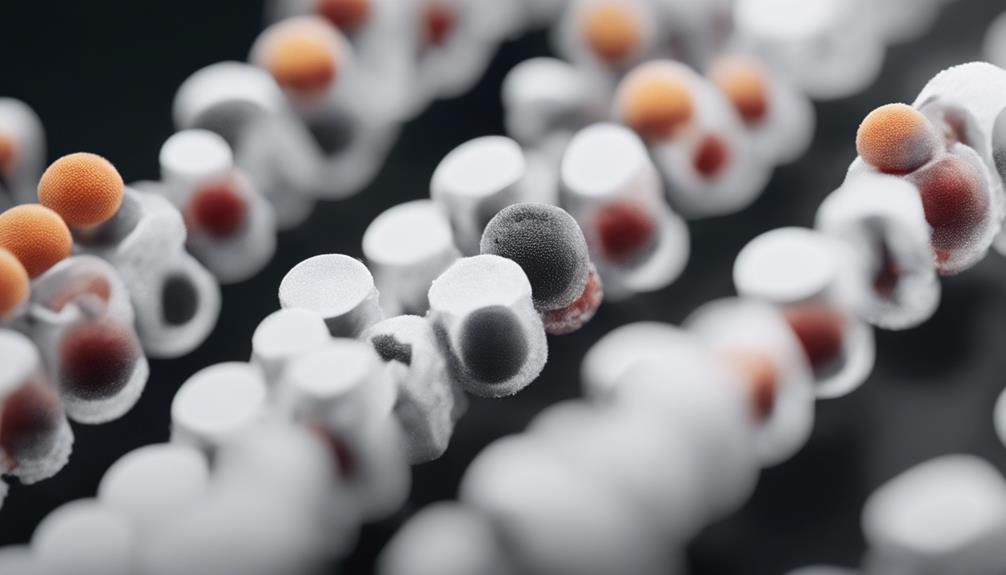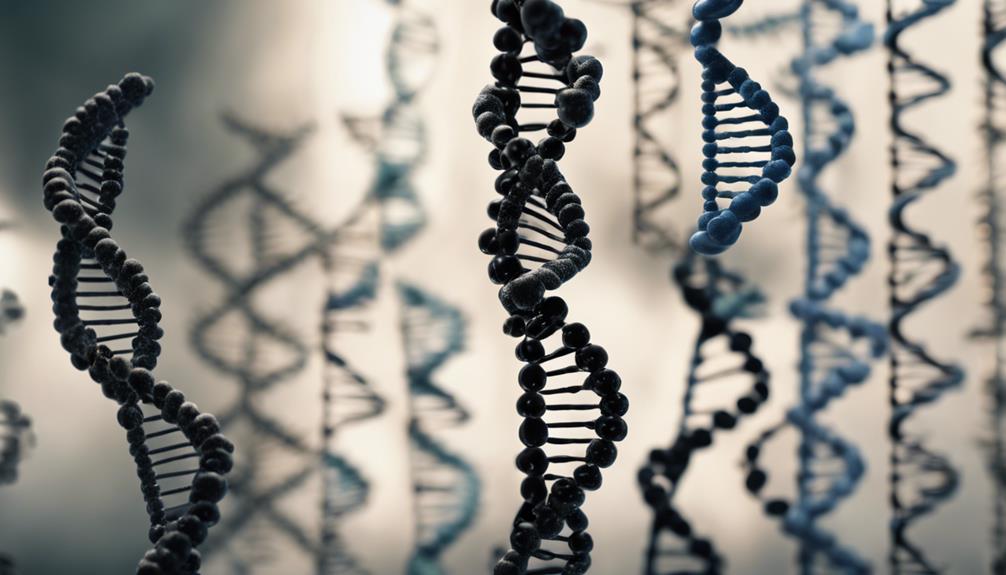Genetic variations from the Black Death era provided immunity against the bubonic plague but also increased susceptibility to autoimmune diseases in modern populations. Survivors passed down mutations that offer protection while elevating the risk of immune disorders. These adaptations were essential for surviving the Black Death but have consequences on present-day health. Specifically, certain genetic variants predispose individuals to autoimmune diseases like Crohn's, rheumatoid arthritis, and lupus. The interplay between historical adaptations for immunity and the heightened susceptibility to autoimmune diseases sheds light on the delicate balance impacting modern health. Understanding this genetic legacy is important for comprehending current health challenges.
Key Takeaways
- Genetic adaptations for Black Death immunity increase susceptibility to autoimmune diseases.
- Variants providing plague resistance heighten autoimmune disorder risk.
- Historical immunity trade-off: enhanced survival but raised autoimmune vulnerability.
- Genetic mutations from Black Death era impact modern health risks.
- Legacy of Black Death genetic variations influences contemporary autoimmune conditions.
Impact of Black Death on Immunity
The Black Death era's genetic variants greatly enhanced immunity against the bubonic plague, shaping the modern-day health landscape. Survivors of this devastating pandemic passed down mutations that offered protection against the plague but also increased the risk of immune disorders and susceptibility to autoimmune diseases. These genetic adaptations, important for surviving the Black Death, inadvertently left a legacy affecting modern health outcomes.
The trade-off between immunity to ancient infections and susceptibility to autoimmune diseases is a direct consequence of the genetic variants inherited from Black Death survivors. Individuals with specific genetic variations had a notably higher chance of surviving the Black Death, demonstrating the evolutionary advantage these mutations provided during the pandemic. However, the same genetic variants that conferred resistance to the plague also predisposed descendants to immune disorders and autoimmune diseases in later generations. This complex interplay between historical adaptations and modern health challenges highlights the lasting impact of the Black Death on human immunity.
Genetic Variations and Disease Susceptibility

Certain genetic variations that were advantageous during the Black Death era can lead to heightened immune responses but also elevate the risk of autoimmune diseases.
The delicate balance between immunity against infections and vulnerability to autoimmune disorders is modulated by genetic adaptations.
The increased immune sensitivity linked to the Black Death may play a role in the development of autoimmune conditions seen today.
Disease Genetic Variations
Genetic variations arising from historical pandemics like the Black Death have influenced modern-day susceptibility to autoimmune diseases. The genetic adaptations that were favored by the Black Death, while providing protection against infectious diseases, also increased the risk of developing autoimmune conditions in current populations.
Individuals carrying certain genetic variants from the Black Death era exhibit a heightened vulnerability to autoimmune disorders such as Crohn's disease, rheumatoid arthritis, and lupus. These specific genetic variations selected for by the Black Death era can lead to increased immune sensitivity, potentially predisposing individuals to autoimmune diseases.
The delicate balance between immunity against infections and susceptibility to autoimmune conditions is intricately linked to these genetic variations. The legacy of past pandemics, like the Black Death, continues to impact modern health outcomes, shedding light on the complex interplay between historical genetic adaptations and present-day disease susceptibilities.
Health Susceptibility Genes
Among modern populations, susceptibility to various diseases is intricately linked to specific health susceptibility genes, reflecting a complex interplay between genetic variations and disease predisposition.
Genetic variations favored by Yersinia pestis during the Black Death have been found to increase immune response but also raise the risk of autoimmune diseases. Individuals carrying certain genetic variants associated with the Black Death are more prone to autoimmune conditions such as Crohn's disease, rheumatoid arthritis, and lupus.
The delicate balance between protection against infectious diseases and vulnerability to autoimmune disorders is heavily influenced by genetic adaptations that were selected for during the Black Death pandemic. Genetic mutations inherited from Black Death survivors may contribute to heightened immune sensitivity and susceptibility to autoimmune diseases in present-day populations.
While the study didn't establish connections with HLA genes, the significance of the ERAP2 gene in immune response underscores the intricate relationship between genetic variations and disease susceptibility, particularly in the context of autoimmune diseases.
Modern Immunity Challenges
The legacy of genetic adaptations from historical pandemics like the Black Death continues to shape modern immunity challenges. Particularly in relation to disease susceptibility and genetic variations. Genetic variations that were favored by the selective pressure of the Black Death have inadvertently increased the vulnerability of modern populations to autoimmune diseases.
Certain individuals carrying genetic variants that provided protection against the Black Death now face a heightened risk of immune disorders. The delicate balance between the strength of the immune response and susceptibility to diseases is intricately tied to these genetic adaptations from past infectious outbreaks.
Specific mutations that conferred survival advantages during the Black Death have been identified as risk factors for inflammatory and autoimmune conditions in contemporary times. The evolution of immune-related genes in response to historical pandemics, such as the Black Death, has led to unforeseen consequences, contributing to a higher prevalence of autoimmune diseases in the population.
ERAP2 Gene and Immune Response

The ERAP2 gene plays a vital role in the immune system by encoding a protein that helps process proteins from invading pathogens. Variations in this gene have been found to impact the effectiveness of immune cells in responding to Yersinia pestis infection, the bacterium responsible for the Black Death.
Individuals with functional copies of the ERAP2 gene demonstrate improved abilities to combat Y. pestis, shedding light on the historical impact of this gene on disease immunity.
ERAP2 Gene Function
Playing an essential role in the immune response, the ERAP2 gene codes for a protein responsible for cutting up proteins from invading pathogens. Variations in the ERAP2 gene can impact the performance of immune cells, affecting their ability to combat infections such as Yersinia pestis.
Individuals with specific ERAP2 gene variants exhibit varying capabilities in killing Yersinia pestis bacteria, with those possessing vital copies of the gene showing enhanced bacterial elimination by immune cells. These gene variants may extend their influence beyond bacterial infections, influencing broader aspects of immune responses.
The intricate functions of the ERAP2 gene highlight its significance in shaping the body's defense mechanisms against pathogens. Its role in processing proteins essential for immune responses underscores the importance of understanding genetic variations in optimizing immune system functions against various infectious agents.
Immune System Regulation
In orchestrating immune responses, the ERAP2 gene plays an essential role by encoding a protein vital for processing proteins from invading pathogens. Variations in the ERAP2 gene, such as the ERAP2 variant, have been shown to influence immune cell performance and response to Y. pestis infection.
Individuals harboring functional copies of the ERAP2 gene exhibit an enhanced ability to combat Y. pestis bacteria. Moreover, genetic variants within the ERAP2 gene may have broader implications on the immune response beyond simply bacterial killing.
Historical Disease Impact
During the Black Death outbreak, individuals possessing the ERAP2 gene variant experienced a significant increase in survival rates. This genetic variation played an essential role in enhancing immune system responses to Yersinia pestis infection, ultimately boosting the chances of survival during the plague.
Key points to ponder regarding the impact of the ERAP2 gene variant on historical disease outcomes include:
- The ERAP2 gene variant identified in the study increased survival odds by up to 40% during the Black Death.
- Genetic changes near the ERAP2 gene influenced immune system responses to Yersinia pestis infection.
- Presence of the ERAP2 gene variant enhanced the performance of immune cells in killing Y. pestis bacteria.
These findings shed light on the intricate relationship between genetic factors, immune responses, and disease outcomes, highlighting the critical role of specific gene variants like ERAP2 in shaping historical events such as the Black Death.
Link to Autoimmune Diseases

Genetic variants that conferred immunity to the Black Death have been found to be linked with an increased susceptibility to autoimmune diseases. While these genetic adaptations provided survival advantages during the Black Death era, they have inadvertently predisposed modern populations to autoimmune disorders. The same immune responses that protected individuals from the plague may now contribute to the development of conditions where the immune system attacks the body's tissues. This trade-off highlights the complex interplay between historical disease pressures and present-day health challenges.
To illustrate this relationship:
| Immune System | Genetic Variants | Autoimmune Diseases |
|---|---|---|
| Adaptations from Black Death era | Increase susceptibility | Development in modern populations |
| Historical survival advantage | Linked with autoimmune disorders | Immune system attacks own tissues |
The legacy of genetic variants shaped by past pandemics like the Black Death serves as a reminder of the intricate connections between our immune history and current health vulnerabilities.
Balancing Immunity and Disease Risk

Recent research emphasizes the delicate balance between immune system challenges and disease resistance trade-offs. Maintaining this equilibrium is essential for overall health.
Understanding how enhancements in immunity against ancient infections may lead to autoimmune conditions is pivotal in managing modern-day health challenges.
Immune System Challenges
Finding the delicate balance between immunity and disease risk poses a significant challenge for the human immune system. Genetic adaptations that provided immunity to the Black Death may have inadvertently increased susceptibility to autoimmune diseases.
The evolutionary pressure during the Black Death favored immune genes that enhanced the body's ability to fight off infections, but this may have come at the cost of a heightened risk for autoimmune diseases. Balancing the need for robust protection against infections while preventing the development of autoimmune conditions remains essential in understanding the complexities of the immune system.
- Immune genes influenced by the Black Death
- Potential link between Black Death immunity and autoimmune diseases
- Evolutionary pressure shaping immune response and health risks
Disease Resistance Trade-Offs
Survivors of the Black Death inadvertently passed down mutations that provide protection against the plague while increasing susceptibility to autoimmune diseases, highlighting the intricate balance between immunity and disease risk in modern health. Genetic adaptations that once conferred survival advantages during the Black Death now present a double-edged sword in the form of heightened vulnerability to autoimmune conditions. This delicate equilibrium between safeguarding against infectious diseases and coping with autoimmune disorders underscores the complex interplay of historical genetic legacies on contemporary immune systems.
| Immune Systems | Genetic Adaptations | Autoimmune Diseases |
|---|---|---|
| Key players in defense against pathogens | Result of past evolutionary pressures | Conditions where immune system attacks body's own tissues |
| Comprise a network of cells, tissues, and organs | Can enhance resistance to specific diseases | Examples include rheumatoid arthritis and lupus |
| Can be influenced by genetic factors | May predispose individuals to autoimmune conditions | Require a delicate balance for best health |
The trade-off between disease resistance and autoimmune risk serves as a poignant reminder of the enduring impacts of ancient pandemics on present-day health challenges.
Maintaining Health Balance
Maintaining a delicate balance between immunity and disease risk is essential for peak health in modern populations. Striking this balance is important as genetic adaptations for Black Death immunity have inadvertently increased susceptibility to autoimmune diseases in contemporary society. The interplay between immune response strength and disease risk can greatly impact overall well-being. Individuals with certain genetic variants favored by Yersinia pestis, the bacterium responsible for the Black Death, may experience heightened immune activity leading to inflammatory conditions and autoimmune disorders.
- Balancing Immune Response Strength: Ensuring that the immune system responds appropriately to threats without becoming overly reactive is crucial for maintaining health.
- Managing Disease Risk: Understanding the factors that contribute to disease susceptibility helps in mitigating the likelihood of developing various health conditions.
- Autoimmune Diseases: Being aware of the potential risks associated with autoimmune diseases is important for individuals with genetic adaptations related to historical pandemics.
Historical Pandemics and Modern Health

With a lasting impact on genetic immunity, historical pandemics like the Black Death continue to shape modern health conditions. Genetic adaptations that once protected individuals against the Black Death may have inadvertently increased susceptibility to autoimmune diseases in present-day populations. The interplay between immune genes and historical pandemics like the Black Death influences the delicate balance between immune response strength and disease vulnerability.
Survivors of the Black Death passed down genetic mutations that can still be found in modern populations, affecting their health outcomes today. Genes associated with immune responses to ancient infections now play a role in the development of autoimmune disorders in some individuals. Understanding these trade-offs between immune protection and disease vulnerability sheds light on the long-term health consequences of historical pandemics.
Genetic Influence on Disease Resistance

Genetic variants that conferred resistance to the Black Death played a significant role in shaping the immune response to infectious diseases.
While these mutations increased survival rates during historical pandemics, they also introduced a trade-off by elevating the risk of autoimmune conditions.
The evolutionary impact of disease resistance genes highlights the intricate relationship between genetic adaptations and modern-day health challenges.
Disease Resistance Genes
Amidst the historical backdrop of the Black Death, certain genetic variants emerged as key players in influencing disease resistance and susceptibility to autoimmune conditions. Genetic variants linked to disease resistance during the Black Death increased susceptibility to autoimmune disorders.
Individuals with specific genetic mutations had a higher chance of surviving the bubonic plague. The protective gene variant near ERAP2 enhanced survival odds by up to 40% during the Black Death.
These genetic changes, driven by past infections such as the Black Death, can contribute to inflammatory and autoimmune diseases. While certain genetic adaptations boosted immunity against the Black Death, they also resulted in an increased risk of autoimmune disorders.
This complex interplay between genetic variants that offered protection against historical diseases and their potential to increase vulnerability to modern health conditions underscores the intricate relationship between past pandemics and present-day health challenges.
Evolutionary Impact on Health
The influence of evolutionary processes on health is evident in the genetic adaptations that have shaped disease resistance and susceptibility throughout history. Genetic adaptations that provided immunity to the Black Death, caused by Yersinia pestis, have had lasting effects on modern-day health.
While these adaptations protected individuals from the deadly plague, they also increased susceptibility to autoimmune diseases. Evolutionary pressure during the Black Death era influenced certain genetic variants that not only defended against Yersinia pestis but also shaped susceptibility to conditions like Crohn's disease, rheumatoid arthritis, and lupus.
The delicate balance between immune response strength for combating infections and the risk of developing autoimmune conditions highlights the complex interplay between genetic adaptations and disease susceptibility. Understanding these trade-offs is vital in genetic research aimed at unraveling the evolutionary impact on health and the development of autoimmune diseases.
Evolutionary Cost of Immunity

In the ongoing interplay between immunity and health, the evolutionary cost of immune protection becomes increasingly evident.
- Genetic adaptations that conferred immunity to the Black Death era also heightened the risk of autoimmune diseases in contemporary populations.
- Specific genetic variants that shielded individuals from the Black Death created a trade-off, increasing susceptibility to autoimmune disorders.
- Evolutionary pressures during the Black Death period favored genes that boosted immune responses but also raised the likelihood of autoimmune conditions.
The balance between immune defense against historical infections and vulnerability to autoimmune diseases underscores the intricate consequences of genetic adaptations. Mutations that provided a survival advantage during the Black Death era continue to influence modern health, illustrating the enduring impact of immunity-related genetic changes.
This evolutionary trade-off emphasizes the complex nature of human adaptation to historical diseases and sheds light on the lasting repercussions of past pandemics on present-day health challenges.
Black Death's Genetic Legacy

Genetic mutations inherited from survivors of the Black Death continue to impact modern-day health outcomes. The genetic legacy of the Black Death reveals a complex interplay between immunity and susceptibility.
During the Black Death, certain genetic variants provided protection against the plague, increasing survival rates. However, these same mutations also elevated the risk of immune disorders in modern populations. The evolutionary response to the Black Death resulted in a trade-off where individuals gained immunity to infections but became more vulnerable to autoimmune conditions.
This genetic legacy highlights the lasting consequences of historical pandemics on human health today. The mutations passed down from survivors not only shaped the immune response to the Black Death but also influenced the prevalence of autoimmune diseases in present-day populations.
Understanding this genetic legacy sheds light on the intricate relationship between past infectious diseases and current health challenges, emphasizing the long-term impact of historical events on human biology.
Immune Response to Y. Pestis

Pivoting from the discussion on Black Death's genetic legacy, insights into the immune response to Y. Pestis reveal critical genetic variants near the ERAP2 gene that enhanced survival rates during the plague. Variants near the ERAP2 gene played a pivotal role in boosting the immune system's response to Y. Pestis, the bacterium responsible for the Black Death. Individuals carrying two copies of the protective ERAP2 variant exhibited a 40% higher survival rate during the plague, indicating the significant impact of this genetic factor on immunity.
The ERAP2 gene is vital in detecting and responding to infections like Y. Pestis.
Macrophages carrying the protective ERAP2 variant demonstrated enhanced efficiency in killing Y. Pestis bacteria.
Genetic variants near ERAP2 may have broader implications for the immune response to Y. Pestis and other infectious agents, highlighting the gene's importance in combating pathogens effectively.
Risk of Autoimmune Diseases

During the era of the Black Death, genetic variants that conferred immunity to the plague inadvertently heightened susceptibility to autoimmune diseases. The same immune genes that provided protection against the deadly Y. Pestis bacteria also left individuals more prone to autoimmune conditions.
It seems that the long-term selection for immunity against the plague came at a cost, leading to an increased risk of autoimmune disorders in those with specific genetic adaptations from that era. This trade-off highlights a delicate balance in the human immune system, where survival against one threat may increase vulnerability to another.
As a result, individuals with these genetic variants face a higher likelihood of developing autoimmune diseases, showcasing the complex interplay between immunity, genetic predispositions, and health outcomes. Understanding these connections can provide valuable insights into the origins and risks associated with autoimmune conditions in modern populations.
Genetic Predisposition to Illness

The inherited predisposition to certain illnesses can greatly impact an individual's health outcomes and susceptibility to diseases. Genetic variants that provided protection against the Black Death may inadvertently increase the likelihood of developing autoimmune diseases in modern populations. These mutations, which offered a survival advantage during the plague, could now contribute to immune disorders that affect individuals today.
The delicate balance between the strength of the immune response and susceptibility to diseases is intricately linked to past genetic adaptations shaped by historical events such as the Black Death. Survivors of this devastating pandemic passed down genetic changes that continue to influence the prevalence of certain health conditions in contemporary society. The lasting consequences of these genetic adaptations underscore the complex interplay between historical immunity and modern health risks, shedding light on how past events like the Black Death can still impact the health outcomes of present-day populations.
Historical Immunity and Modern Risks

Examining the genetic legacy of past pandemics like the Black Death reveals the intricate interplay between historical immunity and present-day health risks. Genetic variants that once provided protection against the Black Death are now associated with an increased susceptibility to autoimmune diseases in modern populations.
Individuals carrying specific immune genes that offered survival advantages during the Black Death era face a heightened risk of immune disorders today. This trade-off between immunity to historical infections and susceptibility to autoimmune conditions underscores the evolutionary consequences of past pandemics like the Black Death.
Recent research suggests that genetic adaptations developed for surviving the Black Death may have inadvertently amplified vulnerability to autoimmune diseases in contemporary populations. Understanding the genetic basis of past pandemics sheds light on the complex relationship between historical immunity and modern health risks, emphasizing the intricate balance between immunity to ancient threats and the emergence of autoimmune conditions in the present day.
Disease Vulnerability Post-Black Death

After the Black Death, individuals with genetic variants that once conferred immunity to the plague now face heightened vulnerability to autoimmune diseases. Long-term selection for protection from the plague led to an increased vulnerability to autoimmune conditions. Survivors passed down mutations that enhanced their immunity but raised the risk of immune disorders. The balance between protection from infectious diseases and susceptibility to autoimmune diseases was influenced by genetic adaptations from the Black Death.
The genetic variants that once provided immunity to the Black Death have inadvertently left individuals more susceptible to autoimmune diseases. These immune genes, which aided in surviving the historical pandemic, now contribute to an increased risk of autoimmune conditions in modern populations. While these genetic adaptations were pivotal for survival in the face of the Black Death, they've led to a trade-off, leaving descendants more prone to autoimmune disorders. This shift highlights the complex interplay between historical immunity and modern health challenges.
Genetic Adaptations and Health Trade-offs

Although often beneficial in the past, genetic adaptations tied to immunity from the Black Death now pose risks for autoimmune and inflammatory conditions. Individuals with protective genetic variants against the Black Death had a notably higher chance of survival, emphasizing the evolutionary trade-off between immune response strength and disease susceptibility.
The specific genetic mutations that provided immunity during the Black Death era have been linked to an increased likelihood of developing long-lasting allergies and immune disorders in modern populations. This highlights the intricate relationship between historical immunity and current health challenges, shedding light on how past infectious diseases have shaped our genetic makeup and susceptibility to various health conditions.
Understanding these genetic adaptations and the associated health trade-offs is essential for comprehending the complexities of autoimmune and inflammatory diseases in today's world. By delving into our genetic past, researchers can unravel the mechanisms behind these conditions and potentially develop targeted treatments to mitigate the risks posed by these once-protective adaptations.
Frequently Asked Questions
Did People Develop Immunity to Black Death?
People did develop immunity to the Black Death. Genetic variants that protected against this deadly disease greatly enhanced survival chances by up to 40%.
Certain individuals with specific genetic mutations were more likely to survive the bubonic plague. This survival advantage led to the passing down of mutations that boosted immunity but also raised the risk of autoimmune diseases.
The Black Death greatly influenced the evolution of the human immune system by favoring those with particular genetic traits.
Are We Now Immune to the Plague?
While individuals today aren't immune to the plague, advancements in medicine and public health have greatly reduced the risk of widespread outbreaks. Vaccines, antibiotics, and improved sanitation practices play an essential role in preventing and treating the plague.
However, occasional cases still occur, highlighting the importance of continued vigilance and preparedness against infectious diseases. Modern healthcare practices have greatly increased our ability to manage and control the spread of the plague.
What Does Your Immune System Do in Response to the Black Plague?
In response to the Black Plague, the immune system exhibited remarkable adaptations.
One intriguing statistic reveals that certain genetic variants, like the ERAP2 gene, boosted survival odds against Yersinia pestis by up to 40%.
These genetic changes, while beneficial then, may have inadvertently increased susceptibility to autoimmune diseases.
This delicate balance between immunity and autoimmune risks underscores the profound impact of past pandemics on modern-day health considerations.
How Did the Black Plague Change Healthcare?
The Black Plague revolutionized healthcare by highlighting the importance of disease prevention, sanitation, and public health measures.
This devastating epidemic spurred advancements in medical knowledge, leading to the development of quarantine practices and the understanding of infectious disease transmission.
Healthcare systems evolved to prioritize public health interventions, shaping modern healthcare practices and emphasizing the significance of disease control and prevention strategies.
Conclusion
To sum up, while immunity to the Black Death may have provided some genetic advantages, it also came at a cost to modern-day health. The trade-off between historical immunity and susceptibility to autoimmune diseases highlights the delicate balance of our immune systems.
Despite potential benefits, it's important to recognize the genetic predispositions and risks associated with past adaptations. Understanding these complexities can help us navigate the intricate relationship between immunity and disease in the modern world.










